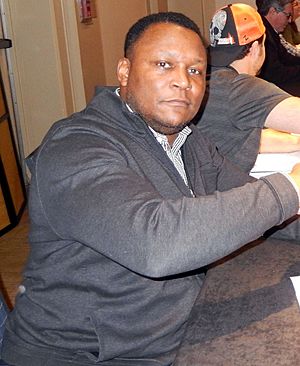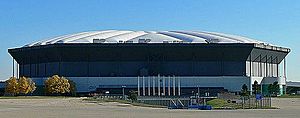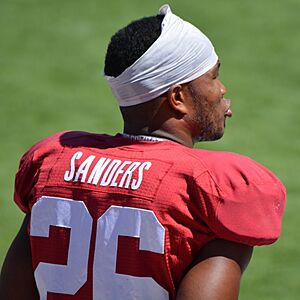Barry Sanders facts for kids

Sanders in 2019
|
|||||||||||||
| No. 20 | |||||||||||||
|---|---|---|---|---|---|---|---|---|---|---|---|---|---|
| Position: | Running back | ||||||||||||
| Personal information | |||||||||||||
| Born: | July 16, 1968 Wichita, Kansas, U.S. |
||||||||||||
| Height: | 5 ft 8 in (1.73 m) | ||||||||||||
| Weight: | 203 lb (92 kg) | ||||||||||||
| Career information | |||||||||||||
| High school: | Wichita North (Wichita, Kansas) |
||||||||||||
| College: | Oklahoma State (1986–1988) | ||||||||||||
| NFL Draft: | 1989 / Round: 1 / Pick: 3 | ||||||||||||
| Career history | |||||||||||||
|
|||||||||||||
| Career highlights and awards | |||||||||||||
|
|||||||||||||
| Career NFL statistics | |||||||||||||
|
|||||||||||||
| Player stats at PFR | |||||||||||||
|
Pro Football Hall of Fame
|
|||||||||||||
|
College Football Hall of Fame
|
|||||||||||||
Barry Sanders (born July 16, 1968) is a famous American former professional football player. He was a running back for the Detroit Lions in the National Football League (NFL) for 10 seasons. Sanders was known for being one of the most difficult players to tackle in NFL history. He was incredibly quick and agile, even though he was 5 feet 8 inches tall and weighed 203 pounds.
Sanders played college football at Oklahoma State University. In 1988, he had one of the best seasons ever for a college running back. He rushed for a record 2,628 yards and scored 37 touchdowns in just 11 games. For this amazing performance, he won the Heisman Trophy, which is given to the best college football player.
The Lions picked Sanders in the 1989 NFL draft. He quickly became a star, winning the NFL Offensive Rookie of the Year award. He led the NFL in rushing yards four times and in rushing touchdowns once. In 1997, he rushed for over 2,000 yards in a single season, which is a rare achievement. He was also named the NFL Most Valuable Player (MVP) that year.
Barry Sanders surprisingly retired from football in 1999 when he was 31 years old. He was still playing at a very high level. He finished his career with 15,269 rushing yards, which was the fourth-highest total in NFL history at the time. He was chosen for the Pro Bowl and an All-Pro team in every one of his ten seasons. The Lions retired his No. 20 jersey in 2004, and he was inducted into the Pro Football Hall of Fame that same year. Many people consider him one of the greatest running backs ever.
Template:TOC limit=3
Contents
Early Life and High School Football
Barry Sanders was born on July 16, 1968, in Wichita, Kansas. He was one of eleven children. His father worked as a roofer and carpenter, and Barry often helped him. Growing up, Barry loved playing youth football and basketball.
Even though he dreamed of being a running back, Barry mostly played defensive back in high school. He was considered a bit small for a running back. In his junior year, his older brother, Byron, was the starting running back. When Byron went to college, Barry was expected to start. However, his coach initially played him at wingback, a position similar to a wide receiver. The coach thought Barry was too small and "lacked contact courage."
Besides football, Barry also played high school basketball, table tennis, and baseball. His family didn't have much money, so they had to be careful with what they spent.
Barry finally became the starting running back in the fourth game of his senior year. The original starter was suspended. In that first game, Barry rushed for 274 yards and four touchdowns! For the rest of his senior season, he rushed for 1,417 yards and scored 17 touchdowns in just seven games. He averaged an amazing 10.2 yards every time he ran with the ball.
His coach offered him more playing time in the last game to help him win the state rushing title. But Barry said it wasn't important and declined. He earned all-state honors and was named an Honorable Mention All-American. Because of his smaller size, he only received scholarship offers from a few colleges. He chose Oklahoma State University.
His choice to play at Oklahoma State caused some disagreement with his father. His father was a big fan of the Oklahoma Sooners, who were rivals with Oklahoma State. But eventually, his father supported Barry and attended all his games.
College Football Career
Barry Sanders played for the Oklahoma State Cowboys from 1986 to 1988. He wore jersey No. 21. For his first two years, he was a backup to another great running back, Thurman Thomas.
In 1987, even as a backup, Barry showed his talent. He led the nation in yards per kickoff return (31.6 yards per return). He also rushed for 603 yards and scored nine touchdowns. Opposing coaches noticed him. The head coach of the Oklahoma Sooners, Barry Switzer, even told his players not to injure Thurman Thomas because he feared Barry Sanders playing in his place!
A Record-Breaking Season
In 1988, Thurman Thomas went to the NFL, and Barry became the starting running back for his junior year. This season is considered one of the greatest individual seasons in college football history.
Barry led the nation by averaging 7.6 yards per carry and over 200 yards per game. He rushed for over 300 yards in four different games! Even with a huge workload, he still returned punts and kickoffs.
He set many college football records that year:
- Most rushing yards in a season: 2,628
- Most rushing touchdowns in a season: 37
- Most total touchdowns in a season: 39 (37 rushing, one kick return, one punt return)
Barry had five games in a row where he rushed for over 200 yards. He scored at least two touchdowns in all eleven games. He won the Heisman Trophy while his team was in Japan for a game. He accepted the award via satellite. He also won the Maxwell Award and the Walter Camp Award.
After this amazing season, Barry initially said he wouldn't enter the NFL draft. But after talking with his father, he decided to go pro.
College Statistics
| Season | Team | GP | Rushing | Receiving | ||||||
|---|---|---|---|---|---|---|---|---|---|---|
| Att | Yds | Avg | Y/G | TD | Rec | Yds | TD | |||
| 1986 | Oklahoma State | 8 | 74 | 325 | 4.4 | 40.6 | 2 | 0 | 0 | 0 |
| 1987 | Oklahoma State | 11 | 105 | 603 | 5.7 | 54.8 | 9 | 4 | 58 | 1 |
| 1988 | Oklahoma State | 11 | 344 | 2,628 | 7.6 | 238.9 | 37 | 19 | 106 | 0 |
| Total | 30 | 523 | 3,556 | 6.8 | 118.5 | 48 | 23 | 164 | 1 | |
NCAA FBS Records
Barry Sanders set 34 NCAA Division I FBS records during his college career. He still holds these important records:
- Most rushing yards in a season: 2,628
- Most rushing touchdowns in a season: 37
- Most 2+ rushing touchdown games in a season: 11
- Most 3+ rushing touchdown games in a season: 8
- Most consecutive games scoring two or more touchdowns: 13
- Most games rushing for 300+ yards in a season and career: 4
- Most all-purpose yards per game in a season: 295.5
- Most rushing yards per game in a season: 238.9
Professional Football Career
| Height | Weight | 40-yard dash | ||||||||||
|---|---|---|---|---|---|---|---|---|---|---|---|---|
| 5 ft 7+5⁄8 in (1.72 m) |
203 lb (92 kg) |
4.37 s | ||||||||||
| All values from Pro Day | ||||||||||||
The Detroit Lions picked Barry Sanders third overall in the 1989 NFL draft. He was allowed to enter the draft early because his college team was facing penalties from the NCAA. The Lions' coach, Wayne Fontes, really wanted Sanders on his team.
Sanders signed a five-year contract worth $9.5 million. He even donated $210,000 of his signing bonus to his church. In his first press conference, he said he wanted to help the Lions become a great team again.
Early Years and Playoff Win (1989–1991)
In his rookie year (1989), Barry Sanders played in 15 games. In his very first game, he rushed for 71 yards and scored a touchdown. He finished the season with 1,470 rushing yards and 14 touchdowns. This set a new record for rookies and for any running back in Lions history. He won the NFL Offensive Rookie of the Year Award and was selected for the Pro Bowl.
In 1990, Sanders led the NFL in rushing yards with 1,304. He was the first Lions running back to do this since 1940. He also scored 13 rushing touchdowns. He was again selected for the Pro Bowl.
The 1991 season was a huge success for Sanders and the Lions. He rushed for 1,548 yards and led the league with a career-high 16 rushing touchdowns. He was named to the Pro Bowl and won the Bert Bell Award. The Lions had a great season with 12 wins and 4 losses, making the playoffs for the first time in many years.
In the playoffs, Sanders helped the Lions win their first postseason game since 1957! He broke tackles for a 47-yard touchdown run in their 38–6 victory over the Dallas Cowboys. However, the Lions lost their next game, and Barry never won another playoff game in his career.
Mid-Career Highlights (1992–1994)
In 1992, Sanders continued to play well, rushing for 1,352 yards and nine touchdowns. He passed Billy Sims to become the Lions' all-time leading rusher. He was selected for his fourth Pro Bowl.
The 1993 season was challenging due to injuries. Sanders suffered a torn ligament in his knee and missed five games. Despite this, he still rushed for 1,115 yards and was selected for the Pro Bowl. The Lions made the playoffs again but lost a close game to the Green Bay Packers, even though Sanders had an amazing 169 rushing yards in that game.
In 1994, Sanders had another incredible season. He rushed for 1,883 yards, which was the most in the league that year. He had a career-high 237 rushing yards in one game against the Tampa Bay Buccaneers, setting a record for most rushing yards in a game without scoring a touchdown. He was named the NFL Offensive Player of the Year.
MVP Season and Retirement (1995–1998)
In 1995, Sanders rushed for 1,500 yards and 11 touchdowns. He was again selected for the Pro Bowl. The Lions made the playoffs but lost a high-scoring game to the Philadelphia Eagles.
In 1996, Sanders led the league in rushing yards again with 1,553. He scored 11 rushing touchdowns. By this point, he was among the top rushers in NFL history.
The 1997 season was one of Barry Sanders' most legendary. He rushed for an incredible 2,053 yards, becoming only the third player in NFL history to reach 2,000 rushing yards in a single season. He rushed for over 100 yards in the final 14 games of the season, which is an NFL record. For his amazing performance, he was named the NFL Most Valuable Player (MVP), sharing the award with quarterback Brett Favre. He also won his second NFL Offensive Player of the Year Award. The Lions made the playoffs, but lost to the Tampa Bay Buccaneers.
In his final season in 1998, Sanders rushed for 1,491 yards and four touchdowns. He was selected for his tenth Pro Bowl. Despite his great play, the Lions struggled that year and did not make the playoffs.
Retirement
On July 27, 1999, Barry Sanders announced his retirement from professional football. This was a surprise because he was still playing at a very high level. He sent a letter to his hometown newspaper to make the announcement. He explained that he felt it was time to leave the NFL.
He retired with 15,269 rushing yards, which was the most ever by any NFL player in a 10-year period. He was only 1,457 yards short of breaking the all-time rushing record held by Walter Payton. Many people believe he would have broken the record if he had continued playing.
Sanders later explained that his retirement was due to his frustration with the Lions' management and the team's lack of success. He wanted to play in the Super Bowl, and he felt the team wasn't getting closer to that goal.
Since then, Sanders has reconnected with the Lions. He became a team ambassador in 2017. In September 2023, the Lions honored him with a bronze statue outside their stadium, Ford Field. A documentary film about his retirement, called Bye Bye Barry, was released in November 2023.
NFL Career Statistics
| Legend | |||||
|---|---|---|---|---|---|
| NFL MVP and OPOTY | GS | Games started | TD | Touchdowns | |
| NFL Offensive Player of the Year | Att | Rushing attempts | FD | First downs | |
| Led the league | Yds | Yards | Rec | Receptions | |
| GP | Games played | Avg | Average yards | Fum | Fumbles |
| Bold | Career-high | Lng | Longest (attempt or reception) | Lost | Fumbles lost |
Regular Season
| Year | Team | Games | Rushing | Receiving | Fumbles | |||||||||||||
|---|---|---|---|---|---|---|---|---|---|---|---|---|---|---|---|---|---|---|
| GP | GS | Att | Yds | Avg | Y/G | Lng | TD | FD | Rec | Yds | Avg | Lng | TD | FD | Fum | Lost | ||
| 1989 | DET | 15 | 13 | 280 | 1,470 | 5.3 | 98.0 | 34 | 14 | — | 24 | 282 | 11.8 | 46 | 0 | 0 | 10 | 0 |
| 1990 | DET | 16 | 16 | 255 | 1,304 | 5.1 | 81.5 | 45 | 13 | — | 36 | 480 | 13.3 | 47 | 3 | 0 | 4 | 2 |
| 1991 | DET | 15 | 15 | 342 | 1,548 | 4.5 | 103.2 | 69 | 16 | — | 41 | 307 | 7.5 | 34 | 1 | 18 | 5 | 1 |
| 1992 | DET | 16 | 16 | 312 | 1,352 | 4.3 | 84.5 | 55 | 9 | — | 29 | 225 | 7.8 | 48 | 1 | 7 | 6 | 2 |
| 1993 | DET | 11 | 11 | 243 | 1,115 | 4.6 | 101.4 | 42 | 3 | — | 36 | 205 | 5.7 | 17 | 0 | 6 | 4 | 3 |
| 1994 | DET | 16 | 16 | 331 | 1,883 | 5.7 | 117.7 | 85 | 7 | 76 | 44 | 283 | 6.4 | 22 | 1 | 16 | 0 | 0 |
| 1995 | DET | 16 | 16 | 314 | 1,500 | 4.8 | 93.8 | 75 | 11 | 72 | 48 | 398 | 8.3 | 40 | 1 | 18 | 4 | 2 |
| 1996 | DET | 16 | 16 | 307 | 1,553 | 5.1 | 97.1 | 54 | 11 | 81 | 24 | 147 | 6.1 | 28 | 0 | 5 | 4 | 2 |
| 1997 | DET | 16 | 16 | 335 | 2,053 | 6.1 | 128.3 | 82 | 11 | 86 | 33 | 305 | 9.2 | 66 | 3 | 11 | 4 | 2 |
| 1998 | DET | 16 | 16 | 343 | 1,491 | 4.3 | 93.2 | 73 | 4 | 65 | 37 | 289 | 7.8 | 44 | 0 | 10 | 3 | 1 |
| Career | 153 | 151 | 3,062 | 15,269 | 5.0 | 99.8 | 85 | 99 | 380 | 352 | 2,921 | 8.3 | 66 | 10 | 91 | 44 | 15 | |
Postseason
| Year | Team | Games | Rushing | Receiving | Fumbles | |||||||||||||
|---|---|---|---|---|---|---|---|---|---|---|---|---|---|---|---|---|---|---|
| GP | GS | Att | Yds | Avg | Y/G | Lng | TD | FD | Rec | Yds | Avg | Lng | TD | FD | Fum | Lost | ||
| 1991 | DET | 2 | 2 | 23 | 113 | 4.9 | 56.5 | 47 | 1 | 0 | 9 | 45 | 5.0 | 10 | 0 | 0 | 0 | 0 |
| 1993 | DET | 1 | 1 | 27 | 169 | 6.3 | 169.0 | 44 | 0 | 0 | 2 | 0 | 0 | 0 | 0 | 0 | 0 | 0 |
| 1994 | DET | 1 | 1 | 13 | −1 | −0.1 | −1.0 | 7 | 0 | 0 | 3 | 4 | 1.3 | 3 | 0 | 0 | 0 | 0 |
| 1995 | DET | 1 | 1 | 10 | 40 | 4.0 | 40.0 | 9 | 0 | 2 | 2 | 19 | 9.5 | 11 | 0 | 1 | 1 | 1 |
| 1997 | DET | 1 | 1 | 18 | 65 | 3.6 | 65.0 | 15 | 0 | 3 | 5 | 43 | 8.6 | 15 | 0 | 2 | 0 | 0 |
| Career | 6 | 6 | 91 | 386 | 4.2 | 64.3 | 47 | 1 | 5 | 21 | 111 | 5.3 | 15 | 0 | 3 | 1 | 1 | |
NFL Records and Achievements
Barry Sanders holds several NFL records:
- Most seasons with 1,500 or more rushing yards (5)
- Most consecutive games with 100 or more rushing yards (14)
- Most games with 100 or more rushing yards in a season (14)
- Most 150+ yard rushing games (25)
- Most 150+ scrimmage yard games (46)
- First running back to have two 80+ yard touchdown runs in a game
Awards and Honors
Barry Sanders received many awards and honors during his career:
NFL Awards
- NFL Most Valuable Player Award (1997)
- 2× NFL Offensive Player of the Year Award (1994, 1997)
- 4× NFL rushing champion (1990, 1994, 1996, 1997)
- NFL rushing touchdowns leader (1991)
- 10× Pro Bowl (1989–1998)
- 6× First-team All-Pro (1989–1991, 1994, 1995, 1997)
- 4× Second-team All-Pro (1992, 1993, 1996, 1998)
- PFWA All-Rookie Team (1989)
- Bert Bell Award (1991, 1997)
- NFL 1990s All-Decade Team
- NFL 100th Anniversary All-Time Team
- No. 20 retired by the Detroit Lions
- Pride of the Lions
College Awards
- Heisman Trophy (1988)
- Maxwell Award (1988)
- Walter Camp Award (1988)
- Big Eight Offensive Player of the Year (1988)
- Unanimous All-American (1988)
- Second-team All-American (1987)
- First-team All-Big Eight (1988)
- Oklahoma State Cowboys No. 21 retired
- Oklahoma State Cowboys Ring of Honor
Legacy and Impact
Barry Sanders is widely considered one of the greatest running backs in NFL history. When he retired, he was second all-time in career rushing yards and sixth in career rushing touchdowns. As of 2022, he is still ranked in the top ten for these stats. He averaged 1,527 rushing yards per season and almost 100 rushing yards per game (99.8), which is second only to Jim Brown. He never rushed for less than 1,000 yards in any of his ten seasons.
Sanders was a bright spot for the Detroit Lions, a team that often struggled. He helped them win their first playoff game in decades. However, he only won one playoff game in his entire career. His early retirement is often linked to the team's lack of overall success.
The Lions honored him by retiring his No. 20 jersey in 2004 and inducting him into the Pride of the Lions, their team hall of fame. In 2023, an 8-foot bronze statue of him was placed outside Ford Field, the Lions' stadium.
He was named first-team All-Pro six times and second-team All-Pro four times. He was also named to the NFL 1990s All-Decade team and the NFL 100th Anniversary All-Time Team. In 2004, at age 36, he became the second-youngest player inducted into the Pro Football Hall of Fame.
Sanders was known for his incredible running style, often described as "electrifying" and "elusive." He would make defenders miss with his quick cuts and spins. His 1989 rookie season is still considered one of the best ever for a rookie running back.
Unlike many star players, Sanders was known for his humility. He rarely celebrated after scoring a touchdown; instead, he would simply hand the ball to the referee. He cared more about his team's success than his personal statistics. He also didn't like talking to the press much about his achievements.
Personal Life
Barry Sanders is a Christian. He has four sons: Barry J. Sanders, Nick, Nigel, and Noah. His oldest son, Barry J. Sanders, played running back at Stanford University and Oklahoma State University. His son Nick played basketball at Michigan State University in 2022–2023.
In 2003, Sanders co-wrote his autobiography, Barry Sanders: Now You See Him: His Story In His Own Words. He has also reportedly donated to several charities, preferring to keep his involvement private.
In April 2013, Barry Sanders was chosen to be on the cover of EA Sports Madden NFL 25, a popular football video game. He was the first player to appear on a Madden NFL cover more than once.
In June 2025, Sanders shared that he had a heart attack the previous summer. He spent three days in the hospital. This experience led him to start working on a documentary to help educate people about the symptoms of cardiac arrest, especially for former athletes who might ignore pain.
See also
 In Spanish: Barry Sanders para niños
In Spanish: Barry Sanders para niños
- List of National Football League rushing yards leaders
- List of National Football League annual rushing touchdowns leaders
- List of National Football League rushing champions
- List of NCAA major college football yearly rushing leaders
- List of NCAA major college football yearly scoring leaders
 | Tommie Smith |
 | Simone Manuel |
 | Shani Davis |
 | Simone Biles |
 | Alice Coachman |




